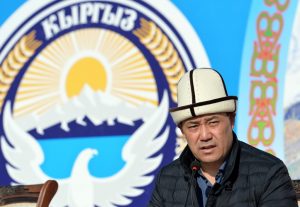A recent public opinion poll in Kyrgyzstan indicated that Sadyr Japarov is at the front of the pack racing for the Kyrgyz presidency with 64 percent of those surveyed responding that they would vote for him if the election were held today. Furthermore, a large majority of those polled (80 percent) support changing Kyrgyzstan’s government back into a presidential republic.
Kyrgyz citizens will head to the polls on January 10 to cast their votes on both questions: Who the next president should be and what kind of government Kyrgyzstan ought to have.
Central Asia Barometer conducted a survey via telephone from December 9 to 17, with a national sample of 1,000 respondents (the survey’s margin of error is 3.09 points). As with all surveys, the true difficulty is in interpreting the results.
In this respect, it’s illustrative to look at the Central Asia Barometer survey next to another survey conducted in Kyrgyzstan back in September by the International Republican Institute. The IRI survey had a similar sample size (1,223) and similar methodology, though was broader in scope.
The two surveys tell us more about the state of politics in Kyrgyzstan when the questions were asked than about what will come in the weeks ahead.
Both surveys asked a variation of a classic political survey question regarding what problems people believe are most important. IRI asked the question “What is the most important problem facing our country today?” and the Central Asia Barometer asked “Which problem concerns you the most at the moment?” (In both surveys, respondents could give more than one answer to the question.)
In the IRI survey — which was held before Kyrgyzstan’s October 4 parliamentary election — “economy – unemployment” was the leading answer (with 61 percent) followed by the coronavirus (51 percent) and corruption (49 percent).
In the Central Asia Barometer survey, conducted after the political storm kicked off following the election, the results of which were swiftly annulled and which led to the resignation of President Sooronbay Jeenbekov, respondents understandably listed “political instability” (40 percent) as their top concern, followed by economic instability (27 percent) and unemployment (25 percent).
Another worthy point of comparison is attitudes toward politicians. Here, the two surveys asked very different questions but they are worth considering side by side nevertheless.
The September IRI survey asked “Which politicians or public persons do you trust the most?” The top answers were Omurbek Babanov (16 percent), Kamchybek Tashiev (12 percent), and Adakhan Madumarov (11 percent). “Zhaparov S” — an alternative spelling for Japarov — received 7 percent. Survey respondents were allowed to give three spontaneous responses. While more than a quarter did not answer the question or did not know, it’s interesting in light of what transpired after the election that Japarov was not among the top three political figures named (there was, also, a large number of respondents who named other politicians but those names are aggregated and obscured by an “other” category).
Turning to the more recent Central Asia Barometer survey which asked “Please tell me, if the presidential elections were held today, which candidate would you vote for?” The top answer was Sadyr Japarov with 64 percent, followed by “I don’t know” with 17 percent, and “refused to answer” with 8 percent. A follow-up question asked that if the their first choice candidate was not on the list, who would they then support. In that contest “Against all” came out on top with 37 percent, followed by “I don’t know” with 33. The top human answer to this second question was Adakhan Madumarov with 14 percent.
When asked in the Central Asia Barometer survey which politicians they trusted the most, respondents listed Japarov as the top answers (48 percent) followed by “Trust no politician” with 31 percent.
On the question of holding a referendum on January 10, 76 percent of respondents to the Central Asia Barometer survey supported it and 80 percent said they wanted Kyrgyzstan to be a presidential republic.
In both surveys, a majority of Kyrgyz said they intended to vote in the respective upcoming elections.
What are we to make of this information? First, a critical disclaimer: surveys are certainly interesting and they tell us something about what some Kyrgyz think about politics at a specific point in time, but they don’t tell us everything.
Second, the trust question is most curious to me. When IRI asked its survey questions, Japarov was sitting in jail where he’d been since 2017, with an 11.5 year sentence holding him there. But since October 4, he’s been busted from jail, made prime minister and then acting president, and is now running for the presidency outright — Japarov is a headline name in the news and public conversation. When asked what politicians they trusted, did people respond with names they could recall most easily? In the swirling mess of Kyrgyz politics, that would be understandable. The fact that Japarov was followed in the answers by “Trust no politician” seems quite meaningful for understanding Kyrgyz attitudes toward politics.
And that brings me to a third point: It’s clear that Kyrgyz politics is not just messy, but underdeveloped. Politicians and the parties to which they belong are constantly shifting. The term “changing shoes” arose during the run-up the the parliamentary election to describe politicians jumping from party to party. That such shifting is widespread suggests that parties (and politicians) are less tethered to any specific ideology or policy prioritizations than they are merely vehicles for personalities to maneuver into positions of power, with individual politicians hitching themselves to whichever cart appears to be pulling ahead.
At the moment, the cart that seems to be pulling ahead is Japarov’s. On January 10, it’s looking increasingly likely that Kyrgyzstan will put him, formally, into the presidency and at the same time open a path for him to wield more power than any of Kyrgyzstan’s post-2010 revolution presidents. Whether such an outcome will lead to political stability is uncertain, and frankly, unlikely.

































